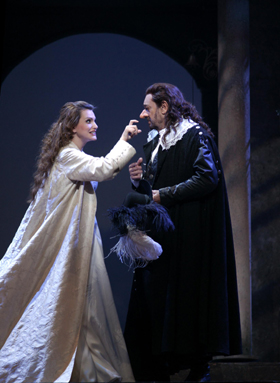 Spain Franco Alfano, Cyrano de Bergerac: Soloists, Madrid Symphony Orchestra, Coro Intermezzo, Pedro Halffter (conductor), Madrid Teatro Real, 10.5.2012 (JMI)
Spain Franco Alfano, Cyrano de Bergerac: Soloists, Madrid Symphony Orchestra, Coro Intermezzo, Pedro Halffter (conductor), Madrid Teatro Real, 10.5.2012 (JMI)
Production: Théâtre du Chatelet Paris
Direction: Petrika Ionesco
Sets and Lighting: Petrika Ionesco
Costumes: Lili Kendaka
Cast:
Cyrano de Bergerac: Plácido Domingo
Roxane: Ainhoa Arteta
Christian: Michael Fabiano
De Guiche: Ángel Ódena
Carbon / Valvert: Franco Pomponi
Ragueneau: Laurent Alvaro
Le Bret: Christian Helmer
La Duenna / Soeur Marthe: Doris Lamprecht

Franco Alfano is better known for having completed Puccini’s Turandot than for his own, largely forgotten, operatic works. The only exception is, to some extent, Cyrano de Bergerac, which has made it onto the stage of a few opera houses in recent years, mainly as a vehicle for Plácido Domingo and Roberto Alagna.
The opera had its premiere in Rome, in Italian, in 1936. A few months later it arrived at Opéra-Comique’s Salle Favart, this time in its French version which has become the better known. All the recent Cyranos have been the done in productions either by Francesca Zambello, Petrika Ionesco (for Domingo), or David Alagna (for his brother). (The sole exception, Michal Znaniecki’s production from Valencia, was an emergency solution after the theatre’s stage collapsed during its first opera season.)
Alfano’s opera is an inconsistent, but brilliantly orchestrated work. For the first hour the opera is only interesting because of the story, much like the third act which does, however, have the added musical interest of Roxane’s aria. The balcony scene and the last act meanwhile have actually inspired music to offer, and that’s where we find the best moments for the opera’s protagonist.
  F.Alfano, Cyrano, P.Fournillier / Valencia Orchestra & Chorus Domingo, Radvanovsky et al. Naxos DVD       F.Alfano, Cyrano Naxos Blu-ray     |
Petrika Ionesco’s production was premiered in 2009 at Paris’ Théâtre du Châtelet for Domingo’s Cyrano-debut in France. A year later it travelled to San Francisco, with Domingo of course (review here), and now it comes to Madrid. There’s no attempt of interpretative reinterpretation, which would probably be absurd in the case of this opera, just a realistic retelling with heavy, hard-to-move sets. The production works better for the crowd scenes than intimate settings. There are few irksome things about it. For starters, the acting begins some eight minutes before the first musical number, all of which could easily have been done before the official curtain time while the audiences still filed into their seats. The overlong scene changes are another problem.
Pedro Halffter, music and artistic director of Seville’s Teatro Maestranza conducted unconvincingly. Cyrano is not Italian verismo, despite its rich orchestration. It is more influenced by Massenet, which means that the conductor has to pay much attention to nuances. Pedro Halffter was generally too loud, though knew well enough to be careful while Superman (a.k.a. Domingo) was on stage. He massacred the end of Roxane’s aria in the third act, boosting the orchestral sound to unnatural proportions The orchestra itself performed well, although I’ve heard them do better in recent times. The chorus under the direction of Andrés Máspero was excellent.
Placido Domingo as Cyrano de Bergerac proved to miracle we know he is. At 71 it is difficult to believe that somebody can still move on stage as he does. In the first part of the opera his voice did not shine much, perhaps understandable given that he does not sing the parts in the original key. In the balcony scene, though, he proved that he is a great artist, and he delivered an exciting final act. I was fortunate to see his Cyrano in Valencia five years ago and I liked it better then. That Madrid audience loves and admires Domingo, but whereas the standing ovations for Simon Boccanegra two years ago (S&H review here) lasted over half an hour, Domingo-in-Alfano had to do with ‘just’ eight minutes.
Sondra Radvanovsky had to cancel as Roxane and was replaced by Ainhoa Arteta, who had sung in the San Francisco production a couple of years back. This was Ainhoa Arteta’s long awaited debut at Teatro Real and she showed that she is at a splendid point in her career. She was the real highlight of the evening, singing and acting with gusto and conviction. Her voice was always fresh and powerful and she had no trouble crossing the orchestral wall, except at the end of her aria, but then that barrier was simply impossible to break through.
The supporting characters are of much less, in fact little importance. Ángel Ódena (De Guiche), Christian Helmer (Le Bret), Franco Pomponi (Carbon, Viscount Valvert) all left a good impression, the rest was serviceable.
José Mª Irurzun